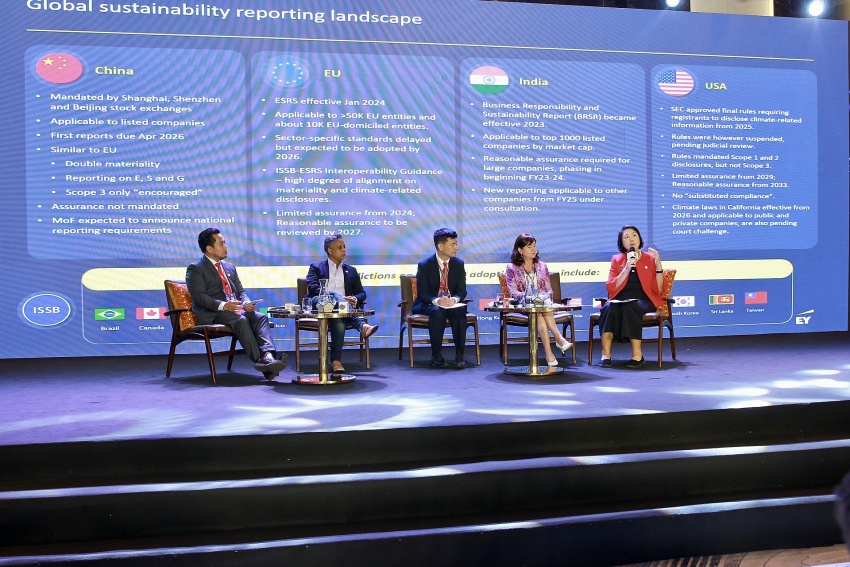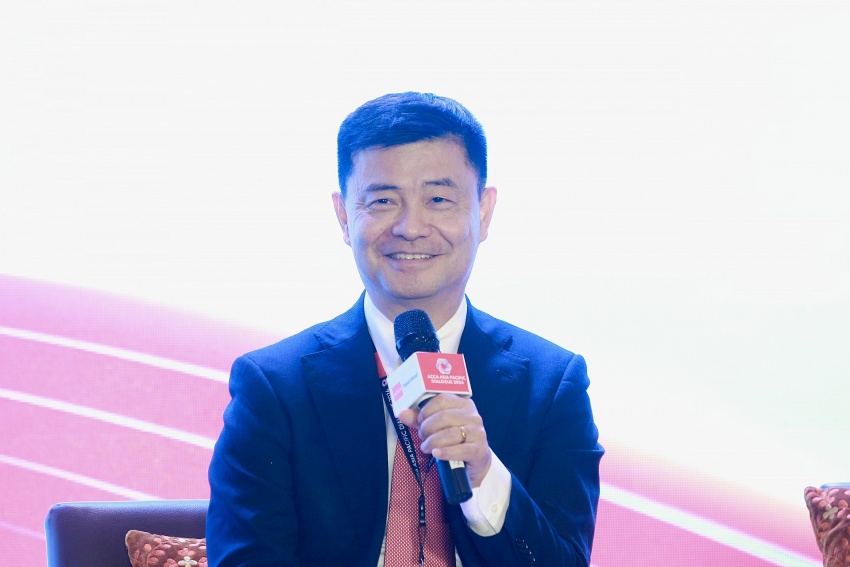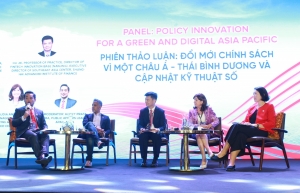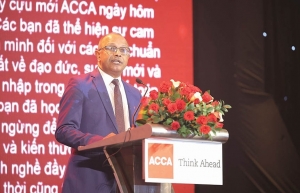Balancing digitalisation and greening the economy
During a panel discussion themed "Policy Innovation for a Green and Digital Asia Pacific" held by the Association of Chartered Certified Accountants (ACCA) on May 28, leaders and top industry experts discussed the goals of sustainable development in the context of digital technology application.
 |
Every country's sustainable development policy is built on strategy, skills, systems, and standards. Among these, standards are the first step.
"In accounting and finance, we already have global standards. In sustainable development, at COP26, we saw new progress with the requirement for global sustainability reporting. Currently, each country and region has its own standards. However, these economic regions account for up to 60 per cent of the global economy, so they can be considered the most important initial standards. We regard these as best practices, focusing on specific elements such as risk management and ESG practices," said Julia Tay, Asia-Pacific public policy leader, Ernst & Young.
“In June 2023, the International Sustainability Standards Board (ISSB) issued its first set of standards, IFRS S1 and IFRS S2, ushering in a new era of sustainability-related disclosures in global capital markets,” added Julia.
With the digitalisation and greening of the economy, the keyword is balance. Each country must balance between different goals: greening the economy on one hand and economic development on the other.
 |
| Hu Jie, director of the Southeast Asia Centre, Shanghai Advanced Institute of Finance |
Hu Jie, professor of practice, director of the FinTech Innovation Centre, Nanjing, and director of the Southeast Asia Centre, Shanghai Advanced Institute of Finance, emphasised, "Countries aim for the highest goal of becoming greener, but the approaches vary. If 10 years ago, we discussed environmental pollution and resource depletion, now many businesses have started to regret trading off the environment for growth. This is why balancing development factors requires focusing on short-term goals and adopting methods suitable for long-term growth."
"Each country has different conditions and considerations, and they must choose different approaches and pathways to achieve the balance point. However, we all currently have the desire to define and apply standards consistently and fully. At the same time, countries are striving to further improve their standards," added Hu Jie.
Emphasising the lack of a unified standard system, experts believe that considerable efforts are needed to form a standard framework and jointly implement it for sustainable goals. Hu Jie argued that for the community of nations to share a vision and harmonise standards, the first element is mutual understanding.
"We need to understand each other clearly to harmonise standards. In this, expanding trade also acts as a support. When engaging in cross-border investment and business, enterprises need to understand the requirements and contexts of different countries. Once understood, harmonisation follows, and so it is with government authorities. Besides, transparency in supervision and management is necessary to ensure transparency of information," said Hu Jie.
Referring to the digital economy and sustainable growth, Julia noted that there is an intersection between sustainability and technology.
"Two to three years ago, when the COVID-19 pandemic occurred, countries increased their protection of sovereignty, which somewhat affected how we exchange and connect with each other. At this forum, there are many leaders and management units. I hope policymakers will closely follow the steps in the sustainability strategy," she said.
 | ACCA Asia Pacific Dialogue raises conversations on a sustainable future The ACCA Asia Pacific Dialogue 2024 held in Hanoi on May 28-29 aims to foster a platform for innovative thinking and strategic dialogue among key stakeholders in the accounting and finance sector, focusing on sustainable finance, digital transformation, and regulatory developments, reflecting the most pressing trends and challenges in the region. |
 | ACCA APAC Dialogue 2024 set for Hanoi The ACCA APAC Dialogue 2024 event (ACCA Asia-Pacific Forum 2024) organised by the Association of Chartered Certified Accountants (ACCA) will officially take place on May 28–29 at JW Marriott Hotel Hanoi. |
 | ACCA report outlines SME agendas for ESG In 2024, the landscape for small and medium-sized enterprises is both promising and challenging. In the heart of Southeast Asia, Vietnam stands at the forefront of economic growth, and has set ambitious growth targets for 2024. |
What the stars mean:
★ Poor ★ ★ Promising ★★★ Good ★★★★ Very good ★★★★★ Exceptional
 Tag:
Tag:
Related Contents
Latest News
More News
- Raised ties reaffirm strategic trust (February 20, 2026 | 14:06)
- Sustained growth can translate into income gains (February 19, 2026 | 18:55)
- The vision to maintain a stable monetary policy (February 19, 2026 | 08:50)
- Banking sector faces data governance hurdles in AI transition (February 19, 2026 | 08:00)
- AI leading to shift in banking roles (February 18, 2026 | 19:54)
- Digital banking enters season of transformation (February 16, 2026 | 09:00)
- IFC to grant $150 million loan package for VPBank (February 13, 2026 | 09:00)
- Nam A Bank forms position as strategic member at VIFC through three key partnerships (February 12, 2026 | 16:39)
- Banks bolster risk buffers to safeguard asset quality amid credit expansion (February 12, 2026 | 11:00)
- VNPAY and NAPAS deepen cooperation on digital payments (February 11, 2026 | 18:21)





















 Mobile Version
Mobile Version